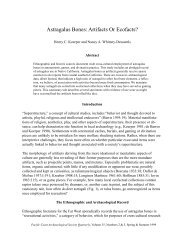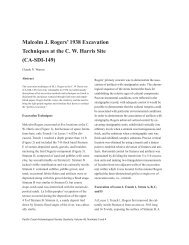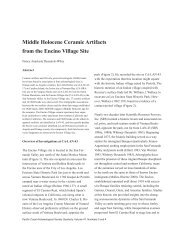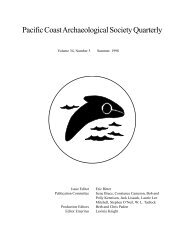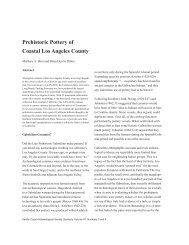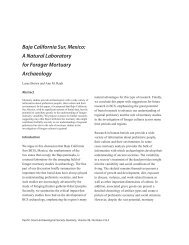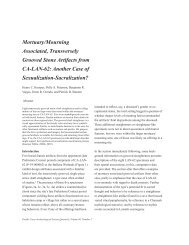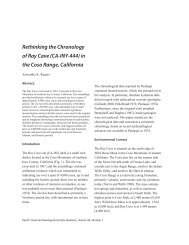Book 2.indb - Pacific Coast Archaeological Society
Book 2.indb - Pacific Coast Archaeological Society
Book 2.indb - Pacific Coast Archaeological Society
Create successful ePaper yourself
Turn your PDF publications into a flip-book with our unique Google optimized e-Paper software.
<strong>Pacific</strong> <strong>Coast</strong> <strong>Archaeological</strong> <strong>Society</strong> History<br />
Stephen O’Neil<br />
Founded as a non-profit scientific, educational, and<br />
advocacy organization in 1961, the <strong>Pacific</strong> <strong>Coast</strong> <strong>Archaeological</strong><br />
<strong>Society</strong> (PCAS) was guided by avocational<br />
archaeologists and historians dedicated to the protection<br />
and study of cultural resources within Orange County<br />
and surrounding areas. The formation of the organization<br />
coincided with a time of rapidly increasing local<br />
population and the expansion of residential and commercial<br />
developments. This growth precipitated a sense<br />
of urgency among the new organization’s members. They<br />
forged a collective response by drafting an outline of<br />
what would become PCAS’s major activities – salvage<br />
excavations, educational meetings, and publication of<br />
a newsletter (Smoke Signals) which disseminated the<br />
results of field work, explained proper field methods, and<br />
announced guest speakers and upcoming events.<br />
Almost from its beginning, PCAS was active in the field,<br />
excavating sites in the coastal area and in the Santa Ana<br />
Mountains. Surveys were conducted to record sites, and<br />
record forms were subsequently filed with the UCLA<br />
Archaeology Department, a for-runner of today’s Information<br />
Centers. To support the integrity of its field work,<br />
the <strong>Society</strong> promulgated a Code of Ethics. During the<br />
time when field work was a primary activity, prospective<br />
PCAS members were required to attend three monthly<br />
meetings and to be sponsored by a member. This was<br />
seen as a way to ensure the ethics and commitment of<br />
new members.<br />
Early in its history, PCAS began a long relationship<br />
with the Bowers Museum where PCAS monthly meetings<br />
were held and where artifacts and records from the<br />
organization’s field work were stored. The decision was<br />
made to publish a scientific journal, the <strong>Pacific</strong> <strong>Coast</strong><br />
<strong>Archaeological</strong> <strong>Society</strong> Quarterly, and the first issue was<br />
published in 1965. The Quarterly welcomed contributions<br />
from both professionals and avocationalists, and<br />
the majority of articles dealt with the material manifestations<br />
of the thought and behavior of Native peoples<br />
of southern California and nearby areas. For most of<br />
its early history, the guiding hands of the journal were<br />
those of Helen Smith and Lavinia Knight.<br />
Over the years as the practice of archaeology changed<br />
in California, so did the PCAS Quarterly. Opportunities<br />
for PCAS excavations diminished, and the professional<br />
field of cultural resource management, CRM, expanded.<br />
The Quarterly became increasingly a venue for CRM<br />
scholarship, although contributions from persons more<br />
associated with academia have endured through recent<br />
volumes. Quarterly subscribers include individuals,<br />
college and university libraries, and CRM firms. There<br />
are subscribers from beyond California and even beyond<br />
the United States. The Quarterly remains the crowning<br />
achievement of an organization begun by avocationalists,<br />
many of whom had been at one time collectors of<br />
Indian relics.<br />
PCAS continues to sponsor talks, open to the public, at its<br />
general meetings which are currently held on the second<br />
Thursday of every month (except for July and August).<br />
In recent years these lecture meetings have been held at<br />
the Irvine Ranch Water District offices in Irvine, with<br />
the exception of the December Holiday meeting held<br />
at the historic San Joaquin Gun Club. PCAS sponsors<br />
outreach programs throughout the year including an annual<br />
program involving students of the public Garfield<br />
viii



